Francis calls for peace in war-torn countries on his first Easter as pope
March 31, 2013 -- Updated 1137 GMT (1937 HKT)
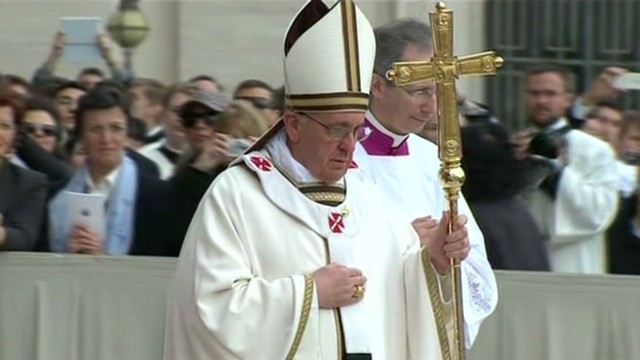
Pope Francis celebrates Easter Mass
STORY HIGHLIGHTS
- NEW: The pope asks for peace in the Middle East, Asia and Africa
- Catholics from around the world pack St. Peter's Square for Pope Francis' first Easter Mass
- In his few weeks as pope, Francis has veered from tradition several times
- Some questioned Francis' decision to wash the feet of two females during Holy Week
Shortly after the Mass at
St. Peter's Square, Francis delivered his Urbi et Orbi -- "to the city
and the world" -- blessing from his papal balcony in the Vatican.
The pope asked "the risen Jesus, who turns death into life," for peace in beleaguered parts of the world.
He asked for peace in the
Middle East, particularly between Israelis and Palestinians "who
struggle to find the road of agreement ... to end a conflict that has
lasted all too long."
He also called for peace
for Syrians -- both those devastated by violence in the country and
refugees in need of help -- and asked for harmony in Mali, the Central
African Republic and on the Korean Peninsula.
The pope was elected
almost three weeks ago, succeeding Benedict XVI. A former Argentine
cardinal, he became the first non-European pope of the modern era, the
first from Latin America, the first Jesuit and the first to assume the
name Francis.
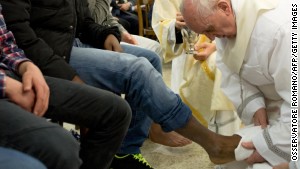 Pope washes prisoners' feet
Pope washes prisoners' feet
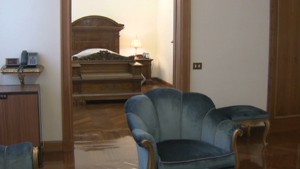 Pope turns down spacious apartment
Pope turns down spacious apartment
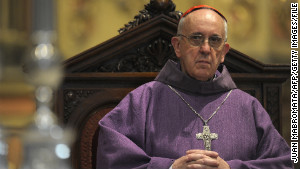 Priests hope to clear Pope Francis' name
Priests hope to clear Pope Francis' name
Already, Francis has repeatedly veered from tradition. Three days ago, on Holy Thursday, he went to a youth detention center in Rome -- rather than the city's chief cathedral -- and washed the feet of a dozen young detainees.
Among the group at the Casal del Marmo were two females and two Muslims.
The pontiff poured water
over the young offenders' feet, wiped them with a white towel and kissed
them. In his homily, given to about 50 young offenders, he said
everyone should help one another.
"As a priest and as a bishop, I should be at your service. It is a duty that comes from my heart," he said.
The act of foot-washing is part of the Christian tradition that mirrors Jesus' washing of his disciples' feet.
Francis' decision to
include two females -- an Italian and an Eastern European -- in the
ceremony disturbed some traditionalists, who believe the 12 people
should reflect the 12 male Apostles.
The Vatican Press Office
responded Friday to "questions and concerns" related to the pope's
washing the young offenders' feet, calling it a "simple and spontaneous
gesture of love, affection, forgiveness and mercy."
"When Jesus washed the
feet of those who were with him on the first Holy Thursday, he desired
to teach all a lesson about the meaning of service, using a gesture that
included all members of the community," the office said in a statement.
"... To have excluded the young women from the ritual washing of feet
... would have detracted our attention from the essence of the Holy
Thursday gospel, and the very beautiful and simple gesture of a father
who desired to embrace those who were on the fringes of society."
1. His name says a lot about him
Unlike other recent
pontiffs -- John Paul II, Benedict XVI -- Pope Francis doesn't have a
numeral after his name. That's because he's the first to take the name
Francis.
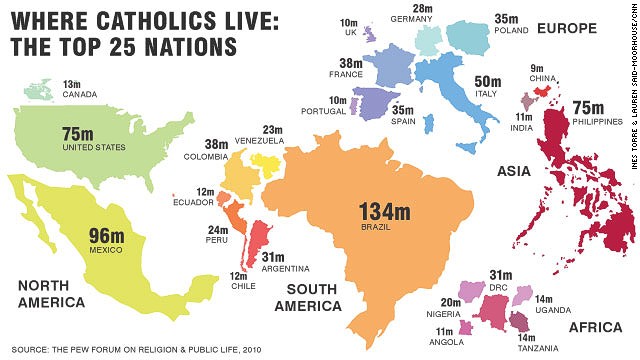 The world's largest Catholic populations
The world's largest Catholic populations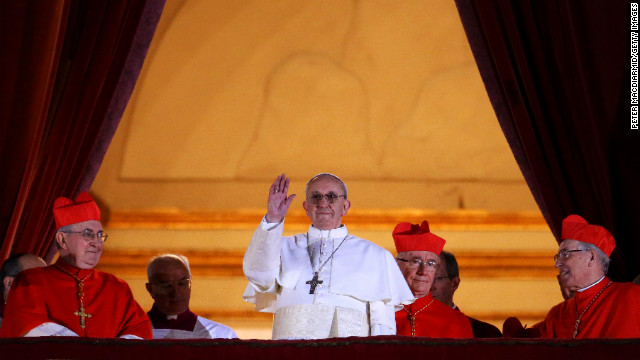 Photos: The new world pope
Photos: The new world pope
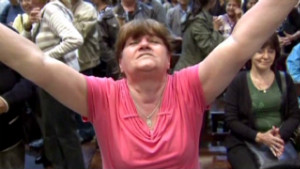 Catholics celebrate Argentine pope
Catholics celebrate Argentine pope
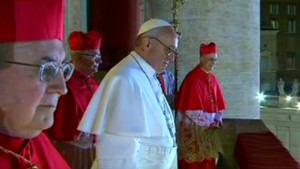 Pope Francis' path to the papacy
Pope Francis' path to the papacy
Why Francis?
The pope wanted to honor St. Francis of Assisi, an admirer of nature and a servant to the poor and destitute.
St. Francis of Assisi was
born the son of a rich cloth merchant. But he lived in rags among
beggars at St. Peter's Basilica in Rome.
Those close to Pope Francis see similarities between the two men.
"Francis of Assisi is
... someone who turned his back on the wealth of his family and the
lifestyle he had, and bonded with lepers and the poor," said the Rev.
Thomas Rosica, the Vatican's deputy spokesman. "Here's this pope known
for his care for AIDS patients and people who are very sick. Who is
known for his concern with single mothers whose babies were refused to
be baptized by priests in his diocese.
"He scolded those priests last year and said, 'How can you turn these people away when they belong to us? '"
2. He's not actually the first pope from outside Europe
Sure, Francis is the
first non-European pope in modern times. But back in the 8th century, a
Syrian -- Pope St. Gregory III -- led the church from 731 to 741 A.D.
We've also had popes
from Bethlehem (St. Evaristus, from 97 to 105 A.D.), Jerusalem (Pope
Theodore I, from 642 to 649) and modern-day Libya (Saint Victor I, from
189 to 199). Several other Syrians have also been pontiff in the last
few millennial.
Of course, the majority of popes have been Italian. But with Francis' appointment, the tide could be shifting to outside Europe.
3. He's a pope of the people
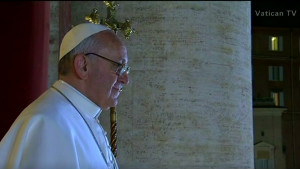 Pope Francis' 'shift in tone'
Pope Francis' 'shift in tone'
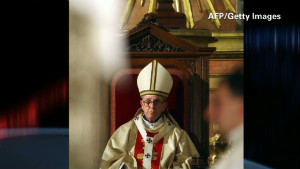 Pope Francis' health
Pope Francis' health
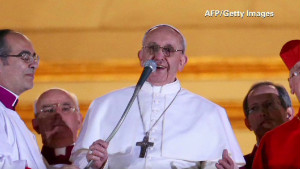 The pope's message on day one
The pope's message on day one
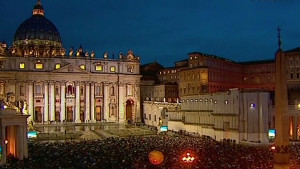 Look back on the day new pope was picked
Look back on the day new pope was picked
In some ways, Pope Francis is just a normal guy.
"The new pope is a very
humble man," said the Rev. Eduardo Mangiarotti, an Argentine priest. "He
takes public transport every day."
He also chose to live in
an apartment instead of the archbishop's palace, passed on a
chauffeured limousine and cooked his own meals, CNN Vatican analyst John
Allen wrote in a profile published by National Catholic Reporter.
In his first public act
as pontiff, Pope Francis broke with tradition by asking the estimated
150,000 people packed into St. Peter's Square to pray for him, rather
than him blessing the crowd first.
"He is a very simple
man," said Luis R. Zarama, auxiliary bishop of Atlanta. "It's very clear
from the way he approached the people and asked them to bless him and
pray for him. It's a beautiful sign of closeness and humility."
The pontiff broke with
another tradition by refusing to use a platform to elevate himself above
the cardinals standing with him as he was introduced to the world as
Pope Francis.
"He said I'll stay down
here," said Cardinal Timothy Dolan, archbishop of New York and the
president of the U.S. Conference of Catholic Bishops. "He met each of us
on our own level."
4. He comes with a side of controversy
Francis opposes same-sex marriage and abortion, which isn't surprising as leader of the socially conservative Catholic church.
But as a cardinal,
Francis clashed with the government of Argentine President Cristina
Fernandez de Kirchner over his opposition to gay marriage and free
distribution of contraceptives.
His career as a priest
in Argentina coincided with the so-called Dirty War -- and some say the
church didn't do enough to confront the military dictatorship.
As many as 30,000 people died or disappeared during the seven-year period that began with a coup in 1976.
Francis, in particular,
was accused in a complaint of complicity in the 1976 kidnapping of two
liberal Jesuit priests, Allen wrote. Francis denied the charge.
"The best evidence that I
know of that this was all a lie and a series of salacious attacks was
that Amnesty International who investigated that said that was all
untrue," said Jim Nicholson, former U.S. Ambassador to the Holy See.
"These were unfair accusations of this fine priest."
But Amnesty International said it did not investigate any individual for their specific involvement.
Vatican stops papal conclave leaks
"Our research focused on the plight of the disappeared," said Susanna Flood, media director for Amnesty International.
5. He faces a host of challenges ahead
Francis takes the helm
of a church that has been rocked in recent years by sex abuse by priests
and claims of corruption and infighting among the church hierarchy.
He may need to find a
way to draw new Catholics into the church where it is in decline, said
Phillip M. Thompson, executive director of the Aquinas Center of
Theology at Emory University.
And he'll also need to
find ways of working with shifting viewpoints among Catholics. In the
United States, for example, 90% of Catholics are using contraception and
82% think it is morally permissible.
"The church has
conservative positions on human sexuality, bioethics, etc., but liberal
positions on issues such as economic regulation, the death penalty and
immigration," Thompson said. "A church divided against itself seems
unlikely to renew our political or cultural structures."
---------------------------------------------------

ไม่มีความคิดเห็น:
แสดงความคิดเห็น